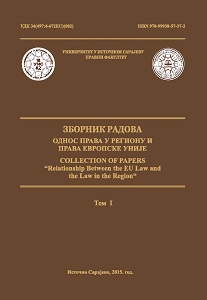Дејство одлука Суда правде о тумачењу права ЕУ донетих у претходном поступку
The Effects of the Court of Justice Preliminary Ruling on the Interpretation of the EU Law
Author(s): Nebojša Raičević
Subject(s): Law, Constitution, Jurisprudence, EU-Legislation
Published by: Правни факултет Универзитета у Источном Сарајеву
Keywords: Court of Justice; Preliminary ruling; Interpretation of the EU; Main proceedings; Ratione temporis effects;
Summary/Abstract: In the founding treaties of the EU as well as in secondary legislation there are no specific norms regulating the effects of the Court of Justice interpretative judgments in the proceedings either before the domestic court where the preliminary question has been raised or before other national courts. However, the judicial practice has engendered certain rules which have filled in the legal gap.In a dozen of its judgment, the Court of Justice pointed out that the interpretation given in the preliminary ruling is binding for the referring court in the main proceedings. This implies that the national court must adjudicate the dispute by applying the EU law in line with the Court’s interpretation.The preliminary ruling is binding not only for the referring court but also for all national courts dealing with the case at a later stage of the proceedings.If domestic court fails to comply with the preliminary ruling, the parties in the main proceedings may use this as the ground for challenging the national court judgment. Concurrently, as it constitutes a breach of the EU law, the Commission may take action against the State concerned for failure to fulfill obligations.The Court of Justice has not explicitly ruled on the effects of the interpretative judgments outside the proceedings where the preliminary question was raised. Yet, in some its decisions, this Court clarified the scope of these judgments in the proceedings before other national courts (erga omnes effects).The Court of Justice has refused to respond to the preliminary question which has already been considered in a previous preliminary ruling, but only referred the national court to the earlier Court decision. The Luxembourg Court has also confirmed that, in such situation, the courts of the last resort are not obliged to refer a preliminary question to the Court. However, as interpretative judgments do not have the res judicata character, the Court of Justice will not dismiss the request for a preliminary ruling as in admissible because it has already ruled on this question. Therefore, the national courts have two options at their disposal: to comply with the earlier interpretation given by the Court of Justice, or to refer a new preliminary question to the Court. In this way, interpretative judgments have the factual erga omnes effect.As for the temporal effect of preliminary rulings, judicial practice clearly shows that they, in principle, have a retroactive (ex tunc) effect, which means that the interpretation of that rule must be applied from the moment the rule enters into force. So, interpretative judgment does not create obligations only for the future (ex nunc) but their effect extends to legal relations established before the delivery of the preliminary ruling. However, interpretations of the EU law do not impact those decisions of national bodies that have already become final prior to the adoption of the Court’s interpretative judgment.In addition, the Court of Justice exceptionally may ad hoc limit the ex tunc effect of the interpretative judgment if the application of retroactive effects may lead to serious financial consequences for the Member States or individual subjects, provided that the wrong interpretation has resulted from significant uncertainty in terms of the meaning of the EU law.
- Page Range: 59-80
- Page Count: 22
- Publication Year: 2015
- Language: Serbian
- Content File-PDF

